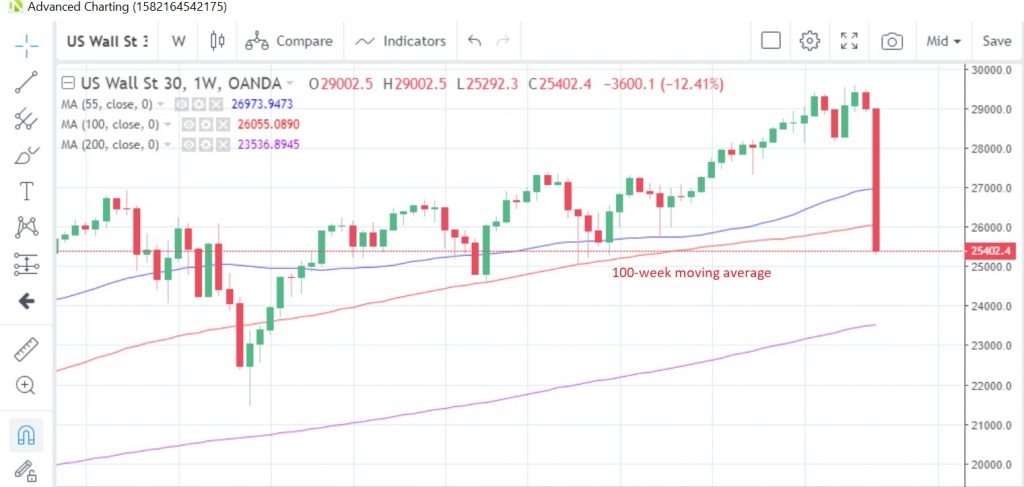Yesterday’s accelerated decline on Wall Street has seen all US indices drop more than 10% from the near-term peak earlier this month, and hence are confirmed in a corrective mode from the longer-term uptrend. Since the US close, Wall Street indices have rebounded mildly, a move seen on most mornings this week, only for it to be reversed later in the day.
The US30 index is up 0.06%, the SPX500 up 0.16% while the NAS100 index has gained 0.13%. The US30 index looks set to close below the 100-week moving average for the first time since December 2018.
US30USD Weekly Chart
Budgets galore for CoVid-19
A South Korean finance ministry official has said that the details of a supplementary budget to combat the CoVid-19 virus will be revealed next week and are likely to be larger than the KRW 11.6 trillion announced during the MERS crisis in 2015. The budget will be aimed at helping small business and those in the medical and tourism sectors.
Meanwhile, Japan has ordered elementary, junior high and high schools to close from Monday until the end of spring break, which is typically early-April. PM Abe has said steps will be taken to ensure the outbreak does not inflict significant damage on the domestic economy, noting that there are reserves available to be tapped into and there would be no need for additional funding.
The 2-year JGB yield hit -0.23%, the lowest since November 2019 while JPY/KRW climbed to the highest level since October last year.
Australia’s Prime Minister Scott Morrison has indicated the government is now considering targeted stimulus for sectors of the economy most severely impacted by the coronavirus outbreak, encompassing sectors from tourism to education.
A German data feast
Germany’s import prices probably fell 0.4% y/y in January, a slower pace than December’s -0.7%, according to the latest survey. Unemployment is seen unchanged at 5% this month, while consumer prices are expected to rise 0.3% m/m at the flash estimate.
US personal income and expenditure are both seen rising 0.3% in January while the prices index within personal consumption expenditure data is seen rising just 0.1% m/m in the same month. The Chicago PMI reading for February is surprisingly expected to improve to 45.9 from 42.9, surveys show, but risks a disappointment to the downside.
The full MarketPulse data calendar can be viewed at https://www.marketpulse.com/economic-events/
Have a great weekend.
Content is for general information purposes only. It is not investment advice or a solution to buy or sell securities. Opinions are the authors; not necessarily that of OANDA Business Information & Services, Inc. or any of its affiliates, subsidiaries, officers or directors. If you would like to reproduce or redistribute any of the content found on MarketPulse, an award winning forex, commodities and global indices analysis and news site service produced by OANDA Business Information & Services, Inc., please access the RSS feed or contact us at info@marketpulse.com. Visit https://www.marketpulse.com/ to find out more about the beat of the global markets. © 2023 OANDA Business Information & Services Inc.



